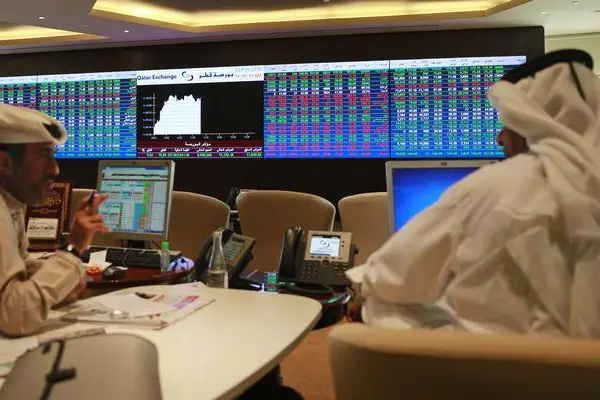PHOTO
The value of transactions involving overseas corporates buying stakes in Middle Eastern companies reached an all-time high of $7.3 billion during the nine months to September 30, according to new data released by Thomson Reuters on Wednesday.
Although the overall value of global mergers and acquisitions (M&As) with a Middle Eastern involvement declined 7 percent year-on-year during the period to $35.2 billion, the amount of overseas money flooding directly into the region as part of these deals surged 220 percent year-on-year to $7.3 billion, according to data in a press statement issued by Thomson Reuters.
The increase in the value of inbound deals was driven higher by American chemicals company Tronox's buyout of a Saudi Arabian titanium dioxide business, as well as acquisitions by Chinese state-owned companies in Abu Dhabi’s onshore oil concessions.
Richard Clarke, a partner and head of deal advisory for consultancy firm KPMG in the Lower Gulf, told Zawya in a phone interview on Wednesday that deals such as stake sales in oil and gas ventures by government-related entities in Abu Dhabi to government-related entities in China was "definitely M&A", but added that such deals can skew inbound M&A figures as these typically only come up for re-tender every 20-30 years.
Despite this, he said that there "have been some really good, normal course" M&A deals, citing both Amazon.com's acquisition of Souq.com, and Majid Al Futtaim (MAF) Group's buyout of the 26 Geant franchise stores in the region.
"The Amazon example is a great example of an international, industry leader identifying this region as a key market they are undercovered in. Rather than building from scratch, they have decided the M&A option is the preferred route to building a presence in this region," Clarke said.
"On the MAF side, it's a family business here looking to invest further into the region and increasing their exposure to the sector. I think that's a really positive story for domestic investment."
Debt capital markets have also been active within the first nine months of the year, according to the Thomson Reuters data.
“Bolstered by Saudi Arabia’s $12.4 billion international Islamic bond in September, Middle Eastern debt issuance reached $84.1 billion during the first nine months of 2017,” Nadim Najjar, managing director of Thomson Reuters in the Middle East and North Africa, was quoted as saying in the company’s release.
“This is 82 percent more than the proceeds raised during the same period last year and by far the best annual start in the region since records began in 1980,” he added.
Middle Eastern equity and equity-related issuance declined by 20 percent year-on-year to just $1.2 billion, which is the lowest amount for the nine-month period since 2004, the report said.
Thomson Reuters is the parent company of Zawya.com.
© ZAWYA 2017
Although the overall value of global mergers and acquisitions (M&As) with a Middle Eastern involvement declined 7 percent year-on-year during the period to $35.2 billion, the amount of overseas money flooding directly into the region as part of these deals surged 220 percent year-on-year to $7.3 billion, according to data in a press statement issued by Thomson Reuters.
The increase in the value of inbound deals was driven higher by American chemicals company Tronox's buyout of a Saudi Arabian titanium dioxide business, as well as acquisitions by Chinese state-owned companies in Abu Dhabi’s onshore oil concessions.
Richard Clarke, a partner and head of deal advisory for consultancy firm KPMG in the Lower Gulf, told Zawya in a phone interview on Wednesday that deals such as stake sales in oil and gas ventures by government-related entities in Abu Dhabi to government-related entities in China was "definitely M&A", but added that such deals can skew inbound M&A figures as these typically only come up for re-tender every 20-30 years.
Despite this, he said that there "have been some really good, normal course" M&A deals, citing both Amazon.com's acquisition of Souq.com, and Majid Al Futtaim (MAF) Group's buyout of the 26 Geant franchise stores in the region.
"The Amazon example is a great example of an international, industry leader identifying this region as a key market they are undercovered in. Rather than building from scratch, they have decided the M&A option is the preferred route to building a presence in this region," Clarke said.
"On the MAF side, it's a family business here looking to invest further into the region and increasing their exposure to the sector. I think that's a really positive story for domestic investment."
Debt capital markets have also been active within the first nine months of the year, according to the Thomson Reuters data.
“Bolstered by Saudi Arabia’s $12.4 billion international Islamic bond in September, Middle Eastern debt issuance reached $84.1 billion during the first nine months of 2017,” Nadim Najjar, managing director of Thomson Reuters in the Middle East and North Africa, was quoted as saying in the company’s release.
“This is 82 percent more than the proceeds raised during the same period last year and by far the best annual start in the region since records began in 1980,” he added.
Middle Eastern equity and equity-related issuance declined by 20 percent year-on-year to just $1.2 billion, which is the lowest amount for the nine-month period since 2004, the report said.
Thomson Reuters is the parent company of Zawya.com.
© ZAWYA 2017





















